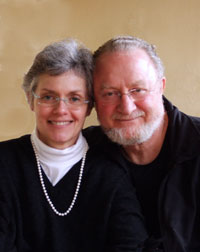The Green View /
Patricia and Conrad Cortellini
Now is the time for doing
prudent works
 What is your position on “climate change?” We Americans are far from reaching a consensus on the issue.
What is your position on “climate change?” We Americans are far from reaching a consensus on the issue.
We who pen “The Green View” have accepted that the Earth’s climate is warming as a result, in part, of human activity—namely, the burning of fossil fuels.
The science is quite persuasive yet plausibility increases when “climate change” is viewed, not as an isolated anomaly, but as the atmospheric component within the context of the destruction wreaked on the environment, the biosphere and life on this planet by the Industrial Revolution.
Science predicts that projected increased concentrations of carbon dioxide in the atmosphere will, at first, result in moderate climate changes.
At some point, however, a tipping point will induce precipitous change that may well be dramatic and irreversible. No one knows what concentration of carbon dioxide will trigger this tipping point, but a safe upper limit has been calculated to be 350 parts per million—log on to www.350.org. Currently, the level is at 387 parts per million and rising. We at “The Green View” feel now is the time for deliberate action.
The position of the Church on “climate change” was elucidated by a well-crafted document issued by the U.S. Conference of Catholic Bishops in 2001 titled “Global Climate Change: A Plea for Dialogue, Prudence and the Common Good.” You can read the entire document at www.usccb.org.
With this document, the bishops of the Church accepted the consensus findings of science and called for the promotion of the “common good” through “prudent action.” Selected quotes from their document include:
• “Global climate is by its very nature a part of the planetary commons. The Earth’s atmosphere encompasses all people, creatures and habitats. … Responses to global climate change should reflect our interdependence and common responsibility for the future of our planet. … Working for the common good requires us to promote the flourishing of all human life and all of God’s creation. In a special way, the common good requires solidarity with the poor, who are often without the resources to face many problems, including the potential impacts of climate change.
• “The virtue of prudence is paramount in addressing climate change. This virtue is not only a necessary one for individuals in leading morally good lives, but is also vital to the moral health of the larger community. Prudence is intelligence applied to our actions. … Prudence not only helps us identify the principles at stake in a given issue, but also moves us to adopt courses of action to protect the common good. Prudence is not, as popularly thought, simply a cautious and safe approach to decisions. Rather, it is a thoughtful, deliberate and reasoned basis for taking or avoiding action to achieve a moral good.
• “In facing climate change, what we already know requires a response; it cannot be easily dismissed …”
The Sunday readings on Sept. 13 addressed the spiritual necessity for action: “What good is it, my brothers, if someone says he has faith but does not have works? Can that faith save him? If a brother or sister has nothing to wear and has no food for the day, and one of you says to them, ‘Go in peace, keep warm, and eat well, but you do not give them the necessities of the body, what good is it? So also faith of itself, if it does not have works, is dead. Indeed someone might say, ‘You have faith and I have works.’ Demonstrate your faith to me without works, and I will demonstrate my faith to you from my works” (Jm 2:14-18).
For the common good, now is the time for prudent works.
(Patricia and Conrad Cortellini are members of Christ the King Parish in Indianapolis.) †
 What is your position on “climate change?” We Americans are far from reaching a consensus on the issue.
What is your position on “climate change?” We Americans are far from reaching a consensus on the issue.